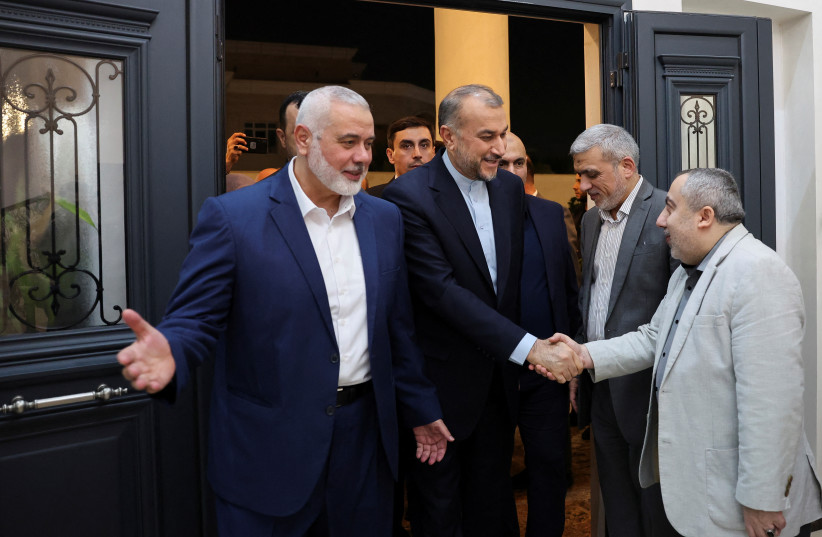Hamas carried out an unprecedented massacre on October 7. However, despite the mass killing and kidnapping of civilians, the group has not suffered diplomatic setbacks in the Middle East. It also has not suffered much globally.
Many countries have yet to condemn the Hamas crimes. In addition, the Hamas leadership, which has been hosted by Qatar for many years, has been able to travel around the Middle East with ease.
Meetings in Turkey, and now in Egypt, illustrate how the Gaza-based terrorist group continues to hold power via its foreign policy.
Hamas leaders have spent years cultivating their image through foreign media and contacts in various countries to advance their agenda. For instance, Mousa Abu Marzouk, a top Hamas official, gave an interview recently to try to portray the group as “moderate,” even though it is not.
Another Hamas official, Ghazi Hamad, gave an interview to NBC in November, and Basem Naim gave an interview to Sky News in October. Hamas official Osama Hamdan has said that if given the chance, his organization would carry out an October 7-style massacre again.
Hamas leaders meet
Recently, Hamas leaders held a meeting in Turkey, according to Israel’s national broadcaster KAN.
Deputy Chairman of Hamas’s Political Bureau, Saleh al-Arouri, and former Hamas chief Khaled Mashal attended. Arouri came from Beirut, while Mashal came from Doha.

After that meeting, Hamas leader Ismail Haniyeh met with Iranian Foreign Minister Hossein Amir-Abdollahian in Doha on Wednesday, Iran International reported. Haniyeh met the top Iranian diplomat on October 15, and again in late November. He spoke with Turkey’s foreign minister the next day.
Hamas has also done significant outreach to Russia since October 7. They have spoken to Russia’s Deputy Foreign Minister Mikhail Bogdanov about issues over the last two months, according to reports.
Now Haniyeh is in Cairo to discuss issues in Gaza. Accompanied by a delegation from Hamas, he is scheduled to meet with the head of Egyptian intelligence, Abbas Kamel, according to Al-Ain media. Agence France-Presse has noted that the discussions could also revolve around a new hostage deal with Israel.
THE LARGER story here is that Hamas has secured influence for itself in the wake of October 7. The attack on Israel, the massacre of civilians, and their brutality, have not diminished support for the terrorist group or its ability to score high-level meetings. Quite the opposite, as it appears to have more leverage now.
This is a major setback after more than two decades of many countries claiming to oppose terrorism. Hamas has also benefited, in part, from a clash between Russia and the West in Ukraine, and also from other factors, such as China’s growing influence in the region.
Beijing, for instance, does not condemn Hamas and has not played a role in confronting the Houthi attacks or helping ships in distress from them. This reveals that some countries believe they can benefit from Hamas and its backers in Iran, who are sowing chaos in the region.
Tehran, for instance, has pushed Hezbollah to carry out attacks on Israel, and Iranian proxies in Syria and Iraq have carried out more than 100 attacks on US forces. The Houthis have caused many companies to stop shipments via the Red Sea.
Malaysia now appears to be boycotting Israel-linked commercial ships. In the past, it was revealed that a Hamas cell had trained in Malaysia in 2014. The IDF noted that year: “In the early hours of July 21, IDF forces captured a Hamas cell commander in Khan Yunis, southern Gaza.”
When questioned by the Shin Bet (Israel Security Agency), the cell commander revealed that he had been sent by Hamas leadership to Malaysia for para-glider training. The plan was to parachute into Israel to kidnap and murder civilians. Nine years later, Hamas used para-gliders in the October 7 attack.
How does Hamas gain more influence?
IT IS IMPORTANT to examine how Hamas has used October 7 to gain more influence in the region and also globally. The terrorist group has done extensive outreach and is sending its leaders around the region and holding court at various meetings.
This also has the result of eroding Palestinian Authority influence. Every time Hamas has a high-level meeting, and the Abbas government in Ramallah does not have a similar meeting, the PA is diminished. Any discussion about who might run Gaza after Hamas needs to take this into account.
There have been some reports that the Hamas leadership in Doha differs from Yahya Sinwar’s views of how policy should be conducted. In some ways, this makes sense, since Sinwar comes from a background of street-level operations, targeting “collaborators,” spending many years in prison, and then preparing Hamas for October 7.
Meanwhile, Haniyeh and others have relaxed in Doha, Beirut, and other places.
However, many Hamas members come from similar backgrounds, so their worldviews have commonalities. They may also prefer to play “good cop, bad cop” when dealing with the international community and media.
This is clear in their various attempts to pretend to “moderate” over the years, which was used to lure Israel into a false sense of security before October 7 in which Hamas appeared to be isolated and deterred. Subsequent developments show how the group has been able to use foreign policy to achieve goals. So far, it has not suffered a major setback on the diplomatic front.
